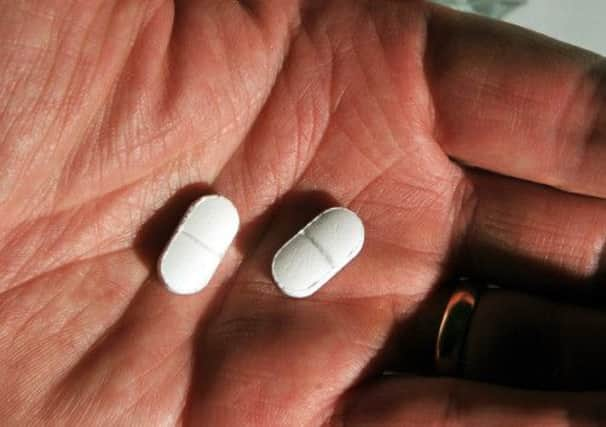Salt in common pills ‘raises heart attack risk’


A major study found people who took the drugs were 22 per cent more likely to suffer a stroke, seven times more likely to develop high blood pressure and 28 per cent more likely to die prematurely from any cause than people taking similar drugs that contained no salt.
Lead researcher Dr Jacob George, from the University of Dundee, said the findings were worrying and millions of Britons who take the drugs on prescription or buy them over the counter or in supermarkets are at risk.
Advertisement
Hide AdAdvertisement
Hide AdThe drugs contained in the British Medical Journal (BMJ) study included effervescent, dispersible and soluble preparations. Types of drugs included paracetamol, aspirin, ibuprofen, vitamin C, calcium, zinc, and metoclopramide, which is used for migraines.
But Dr George said other medicines containing salt could also pose a risk. His team are now calling for the salt content of medicines to be clearly labelled - at present there is no requirement to do so.
Seven-year test
The researchers examined data from almost 1.3 million people who were given at least two prescriptions of salt-containing drugs, or who were taking the same drugs without salt.
The patients were typically followed for seven years.
The results showed that, overall, people on the salt-containing drugs were 16 per cent more likely to suffer a heart attack, stroke or death from a vascular condition than those on the non-salt drugs.
The typical time it took to suffer a health problem was just under four years from first being prescribed the drugs.
Factors likely to affect the results, such as body mass index, smoking, alcohol intake, history of various chronic illnesses and use of certain other medications, were taken into account.
The researchers concluded: “Exposure to sodium-containing formulations of effervescent, dispersible, and soluble medicines was associated with significantly increased odds of adverse cardiovascular events compared with standard formulations of those same drugs.
“Sodium-containing formulations should be prescribed with caution only if the perceived benefits outweigh these risks.”
‘No control’
Advertisement
Hide AdAdvertisement
Hide AdDr George, a senior clinical lecturer and honorary consultant in clinical pharmacology at the University of Dundee, said: “These drugs are also available over the counter, they can be picked up in the supermarket.
“We have no control over how many millions of people are buying these drugs.
“The ones we looked at were prescribed by GPs but there’s a potentially much larger problem with these drugs being bought over the counter and in supermarkets.”
He added: “The main drugs we studied were painkillers and analgesics, and vitamin C, zinc and calcium tablets.
“We looked at drugs that are very commonly used - each drug had at least 1,000 prescriptions on the database.”
Dr George said there was a clear dose-response effect, with people taking higher doses of the salt-containing drugs having a higher risk of suffering a health problem.
He said some people needed soluble drugs because they had difficulty swallowing pills, or the drugs got into the system quicker.
But he said not all drugs contained salt and some people may wish to move on to those prepared without salt.
Advertisement
Hide AdAdvertisement
Hide AdDr George said because there was no clear labelling of the salt content of the drugs, the experts had “struggled” to get the information and often had to call manufacturers “multiple times”.
The researchers said that, as an example, taking eight tablets a day of dispersible and effervescent paracetamol could exceed the recommended daily salt intake for adults, without even counting the effect of other drugs or salt from the diet.
Dr Madina Kara, neuroscientist at the Stroke Association, said: “It’s crucial to be aware of our sodium intake, as it is a component of salt.
“Excess salt in our diet can lead to high blood pressure, which is the single biggest risk factor for stroke.
“A diet low in saturated salt and fat, regular exercise and blood pressure checks can go a long way to keeping your stroke risk down.”